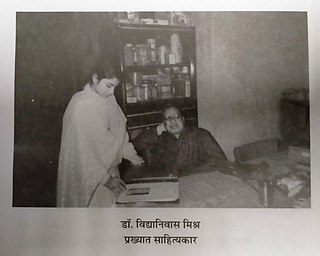
Vishnu Prabhakar was a Hindi writer. He had several short stories, novels, plays and travelogues to his credit. Prabhakar's works have elements of patriotism, nationalism and messages of social upliftment. He was the First Sahitya Academy Award winner from Haryana.

Kartar Singh Duggal was an Indian writer who wrote in Punjabi, Urdu, Hindi, and English. His works include short stories, novels, dramas and plays. His works have been translated into Indian and foreign languages. He has served as director of the All India Radio.

Kamleshwar Prasad Saxena, known mononymously as Kamleshwar, was a 20th-century Indian writer who wrote in Hindi. He also worked as a screenwriter for Indian films and television industry. Among his most well-known works are the films Aandhi, Mausam, Chhoti Si Baat and Rang Birangi. He was awarded the 2003 Sahitya Akademi Award for his Hindi novel Kitne Pakistan, and the Padma Bhushan in 2005.

Pratibha Ray is an Indian academic and writer of Odia-language novels and stories. For her contribution to the Indian literature, Ray received the Jnanpith Award in 2011. She was awarded the Padma Bhushan in 2022.
Ved Rahi is an Indian author predominantly writing in Dogri language. He directed well received mythological serial Meerabai for Doordarshan in 1996 under UTV productions. He is also credited for screenplay and dialogues of various Hindi Bollywood films and TV serials. He directed the Hindi film Veer Savarkar (2001), a bio-epic on the life of Indian revolutionary Vinayak Damodar Savarkar.

The Sahitya Akademi Award is a literary honour in India, which the Sahitya Akademi, India's National Academy of Letters, annually confers on writers of the most outstanding books of literary merit published in any of the 22 languages of the 8th Schedule to the Indian constitution as well as in English and Rajasthani language.

Vidya Niwas Mishra was an Indian scholar, a Hindi-Sanskrit littérateur, and a journalist. He was honoured with Padma Bhushan.

Amritlal Nagar was one of the prominent Hindi writers of the twentieth century.

Jainendra Kumar was a 20th-century Indian writer who wrote in Hindi. He wrote novels include Sunita and Tyagapatra. He was awarded one of India's highest civilian honours, the Padma Bhushan in 1971. He was awarded the Sahitya Akademi Award by the Sahitya Akademi in 1966, for his work Muktibodh (novelette), and its highest award, the Sahitya Akademi Fellowship in 1979.

Vishnu Sakharam Khandekar was a Marathi writer from Maharashtra, India. He was the first Marathi author to win the prestigious Jnanpith Award.

Vijaydan Detha, also known as Bijji, was a noted Indian writer of Rajasthani literature. He was a recipient of several awards including the Padma Shri and the Sahitya Akademi Award.

Chandrashekhara Basavanneppa Kambara is a prominent Indian poet, playwright, folklorist, film director in Kannada language and the founder-vice-chancellor of Kannada University in Hampi also president of the Sahitya Akademi, country's premier literary institution, after Vinayak Krishna Gokak (1983) and U.R. Ananthamurthy (1993). He is known for effective adaptation of the North Karnataka dialect of the Kannada language in his plays, and poems, in a similar style as in the works of D.R. Bendre.

Krishna Sobti was an Indian Hindi-language fiction writer and essayist. She won the Sahitya Akademi Award in 1980 for her novel Zindaginama and in 1996, was awarded the Sahitya Akademi Fellowship, the highest award of the Akademi. In 2017, she received the Jnanpith Award for her contribution to Indian literature.

Gulzar is an Indian Urdu poet, lyricist, author, screenwriter, and film director known for his works in Hindi cinema. He is regarded as one of greatest Urdu poets of this era. He started his career with music director S.D. Burman as a lyricist in the 1963 film Bandini and worked with many music directors including R. D. Burman, Salil Chowdhury, Vishal Bhardwaj and A. R. Rahman. Gulzar also writes poetry, dialogues and scripts. He directed films such as Aandhi and Mausam during the 1970s and the TV series Mirza Ghalib in the 1980s. He also directed Kirdaar in 1993.
Chandra Prakash Deval is a Rajasthani poet and translator. He is also the convener of Rajasthani Advisory Council of Sahitya Akademi.

Mridula Garg is an Indian writer who writes in Hindi and English languages. She has published over 30 books in Hindi – novels, short story collections, plays and collections of essays – including several translated into English. She is a recipient of the Sahitya Akademi Award.

Shrilal Shukla was a Hindi writer, notable for his satire. He worked as a PCS officer for the state government of Uttar Pradesh, later inducted into the IAS. He has written over 25 books, including Raag Darbari, Makaan, Sooni Ghaati Ka Sooraj, Pehla Padaav and Bisrampur Ka Sant.

Sahitya Akademi Translation Prize or Sahitya Akademi Prize for Translation is a literary honour in India, presented by Sahitya Akademi, India's National Academy of Letters, given to "outstanding translations of creative and critical works" in 24 major Indian languages such as English, Rajasthani, Punjabi and the 22 listed languages in the Eighth Schedule of the Indian Constitution recognised by the Sahitya Akademi, New Delhi.















